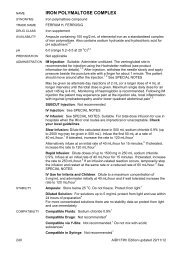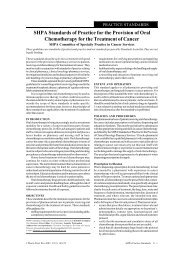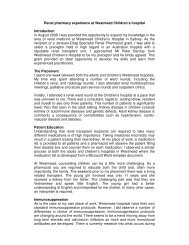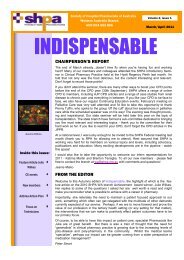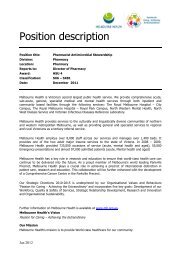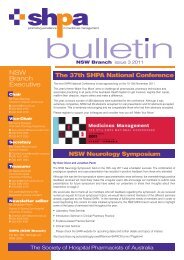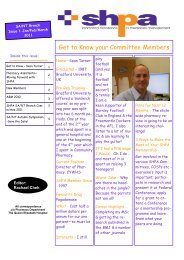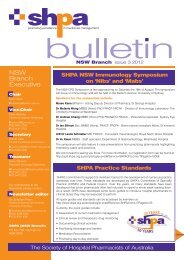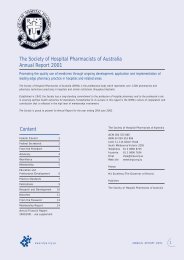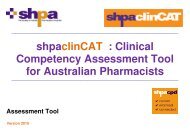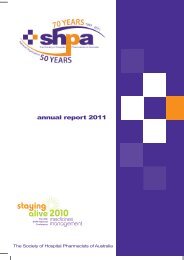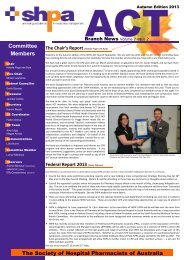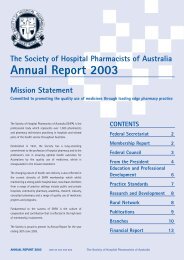references and background material - The Society of Hospital ...
references and background material - The Society of Hospital ...
references and background material - The Society of Hospital ...
You also want an ePaper? Increase the reach of your titles
YUMPU automatically turns print PDFs into web optimized ePapers that Google loves.
Medication review <strong>and</strong> reconciliation should be undertaken whenever the patient is transferred from one<br />
setting to another, whether within the facility or on discharge. <strong>The</strong> activities that are essential for safe <strong>and</strong><br />
effective medication management are:<br />
• medication reconciliation (including an accurate medication history or obtaining a best possible<br />
medication history which is then confirmed using a second source 9 ) on admission/ transfer into<br />
hospital <strong>and</strong> transfer (clinical h<strong>and</strong>over) between units<br />
• management <strong>of</strong> medication issues throughout the admission<br />
• medication reconciliation on discharge/ transfer from hospital <strong>and</strong> provision <strong>of</strong> that verified<br />
information for ongoing care. 1,12,13 (Figure 1)<br />
<strong>The</strong>se activities align with the Australian Charter <strong>of</strong> Healthcare Rights, in particular the patient’s right to<br />
receive safe <strong>and</strong> high quality care. 45<br />
Figure 1 Medication review <strong>and</strong> reconciliation pathway<br />
<strong>The</strong> NSQHS St<strong>and</strong>ard 4 Safety <strong>and</strong> Quality Improvement Guide 17 mentions the use <strong>of</strong> indicators such as 6.2<br />
Percentage <strong>of</strong> patients that are reviewed by a clinical pharmacist within one day <strong>of</strong> admission (Indicators for<br />
Quality Use <strong>of</strong> Medicines in Australian <strong>Hospital</strong>s) 20 as outputs in the improvement process to “implement a<br />
formal systematic process for obtaining <strong>and</strong> recording a best possible medication history”.<br />
At all points <strong>of</strong> care, medication reconciliation supports safe, timely <strong>and</strong> efficient transition <strong>of</strong> patients<br />
through the hospital <strong>and</strong> on discharge, maintaining the continuum <strong>of</strong> care. 6<br />
Pharmacists are medicines experts <strong>and</strong> skilled, effective 21,22 <strong>and</strong> efficient at providing these services. <strong>The</strong>y<br />
are also able to educate, train <strong>and</strong> support other health pr<strong>of</strong>essionals in the healthcare team to conduct<br />
comprehensive, structured medication reconciliation.<br />
Medication review <strong>and</strong> reconciliation continues when patients are returned to community care <strong>and</strong><br />
reviewed by their GP/medical specialist/healthcare provider, on transfer to an aged care facility or to<br />
another hospital, or during Home Medicines Reviews (Figure 1). <strong>The</strong> medicines management cycle<br />
associated with each episode <strong>of</strong> care, independent <strong>of</strong> the setting, is shown in Figure 2. 6,23<br />
SHPA Medicines in focus BACKGROUND MATERIAL – Medication reconciliation – November 2012 3 <strong>of</strong> 8



